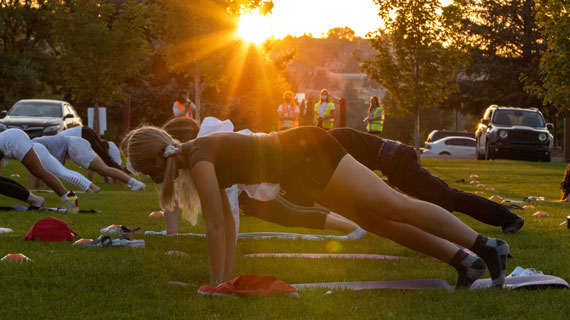How to End the Day Feeling Relaxed
Posted: April 05, 2022 | Author: Abbie Cochrane | Read Time: 5 minutes
 The night seems to be the time when the mind decides to replay all the events of the day while you’re trying to go to sleep. No matter how hard you try, you can’t seem to get your brain to turn off for the night. Perhaps it’s time to shake up your nighttime routine to help your body wind down so you end the day feeling relaxed.
The night seems to be the time when the mind decides to replay all the events of the day while you’re trying to go to sleep. No matter how hard you try, you can’t seem to get your brain to turn off for the night. Perhaps it’s time to shake up your nighttime routine to help your body wind down so you end the day feeling relaxed.
10 Ways to Relax Before Bed
No Technology
Blue light from phones, tablets, TVs, and laptops can really mess with your body’s internal clock, making it think that it’s still time to stay awake, therefore blocking the release of melatonin. Constant tech use before bed can set your body clock back hours, meaning you’ll want to stay up later and sleep in longer. While that sounds like something that isn’t as big of a problem as experts make it out to be, work and school schedules often start bright and early. It won’t be as easy to wake up if you’ve been on your phone all night. Try to turn off all electronics 10 minutes earlier each night until you reach the time that will give you at least 8 hours of uninterrupted sleep.
Read a Book
A paper one, if you please. Again, no tablets. Try cozying up with your favorite mystery novel, romantic drama, or fantasy fiction before you call it a night. Studies show that reading a physical book before bed reduces stress up to 68% as long as you find the story interesting. This can help your body relax faster and fall asleep before you reach chapter ten. If you’re the kind of person who hates reading, try listening to an audiobook. This can help you ease your way out of using your phone at night and listening to a story instead.
Put on Some Chill Music
Any background music can contribute to falling asleep faster as long as it’s calming to you. Music has a big effect on people, whether it goes noticed or not. When you put on soothing music before you sleep, you are stimulating your body’s autonomic nervous system and helping it to relax. This occurs when your breathing slows, your heart rate is lower, and your blood pressure is reduced.
Stretch or Do Yoga
Following the zen vibes, stretching, or doing some light yoga before bed can also reduce your blood pressure and reduce the production of cortisol, the stress hormone. This lowered state of arousal can also help relieve anxieties and insomnia.
Meditate
Take a moment to sit and pay attention to your body and your breathing. Try the five by five breathing exercise; breathing in for five counts, holding for five counts, and exhaling for five counts. You can sit crossed-legged surrounded by candles in a dark room, at your desk, or even laying in bed. This relaxation exercise increases melatonin production in the brain, making it easier for you to fall asleep.
Separate Work From Bedtime
While working from home has become the norm, it's important to distinguish between which spaces in your home are used for work and sleep. Designate a separate room in your house for work, and personalize it so that it’s comfortable and stems productivity. Not only can working on your bed disrupt your sleep schedule, but it can damage your posture and cause backaches. Separating work from bed can help your body more quickly recognize that it’s time to start slowing down. Pick a time to be done with work for the day, and focus on getting sleep so you can continue your tasks fully energized the next day.
Take Some Time to Be Grateful
No matter how many things have gone wrong today, take a moment before bed to write down a few things that you’re grateful for in a journal. It could be something that went well or something that stuck out to you, but keep track of the silver linings on even the most difficult of days. You can also take time to journal, period. This allows you to put the day’s challenges into perspective and process them better. It can also decrease distraction, worry, and stress, allowing you to fall asleep faster.
Make Tea (or Any Calming Drink)
The worst possible thing you can do for your sleep schedule is down a Redbull and pull an all-nighter when you have commitments in the morning. If your brain is going a mile a minute, try one of these teas to help you ground yourself; chamomile, lavender, magnolia, valerian, low-caffeine green tea, passionflower, peppermint, and lemon balm. If tea isn’t your thing, try tart cherry juice, warm milk or almond milk, or good old-fashioned water.
Take a Warm Soak
Hop in the tub and put a bath bomb in there and take a moment to relax. Or, if you’d rather, take a warm shower instead. Science shows that people who shower an hour or two before bed fall asleep faster. Warm water stimulates blood flow to your hands and feet, allowing the extra heat into your body to escape faster. The lowering of your body temperature also contributes to drowsiness.
Get Cozy
A bit obvious. No one likes going to bed in their jeans when they could go to sleep in pajamas, fuzzy socks, and a blanket. Adding a fluffy pillow and soft mattress to the mix makes your sleep journey all that much faster.
Try applying these tips to your nightly routine and get the best sleep you can! The most important thing to remember when applying these tips or any others to your bedtime routine is to be consistent. The more you stick to your routine, the quicker your body will become accustomed to falling asleep with ease. If you’re having trouble sleeping, or you suffer from insomnia, anxiety, or any other issue that could take time off your beauty sleep, talk to a professional about further methods to help you get the rest you need.
This article was published more than 3 years ago and might contain outdated information or broken links. As a result, its accuracy cannot be guaranteed.
Tags: Mental Health Student Life CAPS



